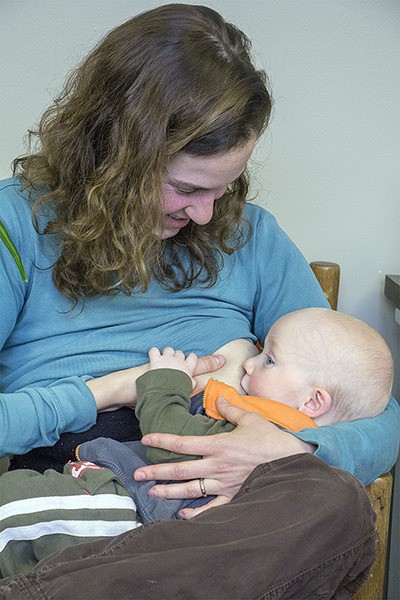The first time Katie Zwilling was asked to cover up while breastfeeding at an Eastsound business, she carried around her anger with her for six months.
When she and another mother, Denise Thomasin, were recently asked to stop breastfeeding at the entrance of a local business she decided to call the police.
“I was shocked that this would happen on Orcas,” said Zwilling.
What upset her most was the fact that she felt like the owner was body shaming her in front of her 3-year-old, Grace. Zwilling did not want her daughter comparing nursing a baby with something indecent.
“She lost a piece of her innocence that day,” she said. Beyond her personal feelings on the subject, Zwilling also called the police because she knew Washington law prohibits a business owner from asking a mother to stop nursing.
In 2001, a Washington state law was enacted that ensured breastfeeding is allowable in public and not indecent exposure.
In 2009, the rules expanded to place breastfeeding mothers in the protection of state anti-discrimination law, allowing breastfeeding in places of public accommodation such as restaurants, pools, theaters, government buildings, museums, libraries, busses or parks.
Washington law also encourages employers to not only support breastfeeding customers, but also breastfeeding employees.
Although police did arrive at the storefront after Zwilling phoned in the incident, the dispute is classified as a civil case. The mothers would have to take the issue to court if they wanted to fight the alleged discrimination. They are not moving forward with any legal action at this time.
The business owner could not be reached for comment at the time of publication.
When to breastfeed?
According to the American Academy of Pediatrics, mothers should be exclusively breastfeeding for six months. Although research shows that nationwide the majority of mothers start off breastfeeding their babies at birth, by three months the numbers start to drop off.
According to the Centers for Disease Control and Prevention’s National Immunization Survey, 79.2 percent of children in the United States were breastfed at some point, but only 49.4 percent were breastfed at six months and only 18.8 were exclusively breastfed at that age. Washington state scored better than the national average with 91.8 percent of babies breastfed at some point, 64.2 percent were breastfed at six months and 20.3 percent were exclusively breastfed at six months.
Why are mothers not nursing their babies at six months and older?
Factors that could affect these numbers include short maternity leaves requiring mothers to go back to work by 12 weeks or earlier and then have trouble keeping up with pumping and nursing. Other mothers have breastfeeding issues soon after birth and don’t have help to solve such problems. It is unclear how acceptance of public breastfeeding affects these numbers, but many state laws supporting public nursing scored higher when it came to mothers breastfeeding beyond six months.
For Zwilling and Thomasin, breastfeeding their babies is not just about providing nourishment.
“Nursing is also about comfort – if he gets scared or has a cold, he wants to nurse,” Zwilling said. “It’s really about the connection with the mom.”
For Thomasin, a mother of five, breastfeeding is the first form of intimacy her babies may ever experience.
“To gaze into each other’s eyes and communicate the unspeakable love which a mother and child might do while breastfeeding is a gift; a short gift before the bitter sweetness of time and age’s passing end the breastfeeding connection,” she said.
Response from the community
According to Zwilling, in both incidents where store owners questioned her about breastfeeding, they said that they were protecting a male client from an “inappropriate act.”
“People that are uncomfortable must see it as sexual,” Zwilling said. “If someone is seeing it that way they might want to find out why that is. There is nothing sexual about it.”
When asked how they felt about breastfeeding in public, more than a dozen Sounder readers wrote in that they supported a mother’s decision to feed their children at Eastsound businesses.
“Let mothers feed their babies at anywhere, any time without shame and without a baby having to wait to be fed because someone has decided to sexualize and deem it a dirty and inappropriate act that is basic, necessary and non-sexual and quite frankly, beautiful and admirable,” wrote Carlin Hayworth.
Dave Conahey called it normal and healthy. Other readers mentioned a woman’s legal right to do it, that mothers should do what is best for their babies and that it should not be an issue.
Moms across the country have been speaking out against public breastfeeding discrimination.
Breastfeeding advocate Emma Kwasnica has posted more than 200 photos on Facebook of herself nursing her children and told a reporter at the Huffington Post that her account has been suspended because of those photos.
The “FB! Stop harassing Emma Kwasnica over her breastfeeding pics” page has 7,872 likes.
This past December a mom in Texas organized a “nurse-in” of 50 mothers in front of a Target store where she claimed she was “harassed and humiliated by staff” while breastfeeding.
According to CNN, in March a woman was harassed on a plane by a flight attendant when she nursed her child.
The Facebook page “Boobs on Board,” which aims to draw attention to mothers who are shamed for nursing in flight, has more than 1,500 followers.
Thomasin’s 10-year-old daughter Emalyne, who was at the Eastsound storefront when her mother was asked to stop breastfeeding, summed up the incident by asking, “What is wrong with nursing?”



